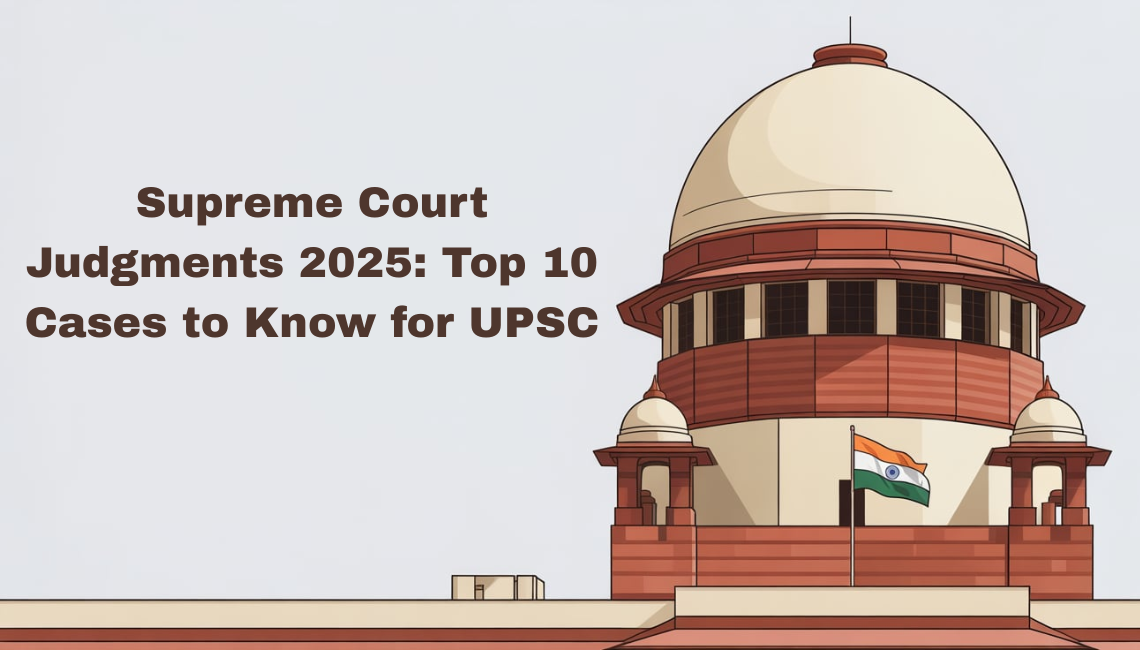The Supreme Court is the protector of the Constitution and fundamental rights. In the eyes of UPSC applicants, the landmark decisions are more than just legal landmarks. They are a reflection of the evolving relationship between law enforcement, society, and the state. They set the policy of the government determine rights, define them, and improve rules of law.
Here are 10 significant Supreme Court judgments of 2025 that each UPSC aspirant should take note of.
1. Right to Privacy in the Digital Age
Based on the landmark K.S. Puttaswamy in v. Union of India (2017) judgement, the Court expanded the extent of the right to Privacy (Article 21) to include protection against unlawful access to personal data. The ruling emphasized the necessity of regulation by the government to regulate Big Tech companies, ensuring that databases tied to Aadhaar, financial and health applications are able to meet the most stringent standards of data security.
2. Environmental Protection vs Industrial Expansion
In a case that dealt with the expanding mining operations in environmentally sensitive areas, the Court used an application of the Doctrine for Sustainable Development (first acknowledged as such in Vellore Citizens' Welfare Forum v. Union of India, 1996). The Court ruled that the growth of industrial activity can not override the rights of environmental protection in accordance with Article 21. It also conforms to regulations under the Environment Protection Act, 1986 as well as the Paris Climate Agreement (2015) commitments.
3. Reservation in Private Educational Institutions
This Court clarified the meaning of reservations in the 93rd Constitutional Amendment (2005) and Article 15(5) and Article 15(5), stating that private non-aided institutions have to ensure that meritocracy is balanced with inclusion. The decision came after debates following the case of Ashoka Kumar Thakur v. Union of India (2008). The Court ordered states to establish clear criteria that guarantee both the quality of their services as well as social justice.
4. Strengthening Protection for Whistleblowers
Reaffirming and strengthening the Whistle Blowers Protection Act, 2014, the Court found that the act of exposing corruption is protected by Article 19(1)(a) (Freedom of Speech). The decision criticized the inefficiency of institutions regarding protection and draws analogies with the killing of activist Satyendra Dubey.
5. Freedom of Speech and Social Media Regulations
The Court tried to balance freedom of speech and accountability for social media. Based on Shreya Singhal v. Union of India (2015) that declared Section 66A unconstitutional under the IT Act, the 2025 ruling stressed that regulation should not limit dissent, but be able to protect against false news, hate speech and online harassment.
6. Child Labour Restrictions
In expanding the scope in The Child Labour (Prohibition and Regulation) Amendment Act, 2016 The Court declared that the involvement of children working in informal jobs at home is unlawful. It also reiterated that education from birth to the age of 14, (Article 21A, RTE Act 2009) should be strictly enforced.
7. Right to Health and Affordable Medicines
The Court used Article 21 to declare access to affordable medicine as a fundamental right, echoed in Paschim Banga Khet Mashedor Samity. The court ordered the state to regulate the price of pharmaceuticals in accordance with the Essential Commodities Act, 1955 making sure life-saving medications are available.
8. Women's Safety and Workplace Harassment
In accordance with the Vishaka v. State of Rajasthan (1997) guidelines as well as recommendations and Sexual Harassment of Women at Workplace (Prevention Prohibition, Redress and Remedies) Act of 2013, the Court in 2025 placed more stringent obligations for employers to comply with the law. It made clear that the dignity of workplaces is fundamental of Article 21 as well as gender justice in Article 15(3).
9. Digital Education and Equality of Access
In the very first instance the Court acknowledged that the Digital Divide as a constitutional problem. Citing the Article 21A (Right to Education) it directed the government to provide access to digital devices at no cost for the most disadvantaged children. The decision highlighted post-COVID differences regarding access to online learning.
10. Electoral Reforms and Transparency
The Court has ruled against the use of opacity in bonds used for elections, ruling that the rights of the citizens in the right to know (Article 19(1)(a)) outweighs the claims of political parties to an anonymity for donors. This is in line with Union of India v. ADR (2002) in which the disclosure of sources of funds used by candidates is legally mandated. The 2025 verdict strengthens the democratic accountability of candidates which is consistent with the current discussions on changes for the election system.
Why These Judgments Matter for UPSC
For aspirants, the cases aren't just about legal nuances, but they also deal with understanding the challenges of governance such as ethical dilemmas, the socio-economic real-world realities. Each decision reflects the Constitution's living principles, balancing rights and obligations and growth with justice and freedom with accountability. These judgements help in the following ways:
-
Integration of GS-II and GS-III: Constitutional provisions, governance, economy, environment.
-
Ethics (GS-IV): Transparency, accountability, Gender justice and intergenerational equity.
-
Practice in writing essays: topics related to justice, democracy rights, inclusion, and development.
Conclusion
The Supreme Court, through its changing jurisprudence, remains important for India’s democracy. The 2025 rulings affirm the Constitution as an ever-changing document that can be adapted to changing circumstances, from privacy concerns for data to electoral reforms. For UPSC aspirants, it isn't just an exercise in preparation for the exam, but rather instilling the Constitution's values of liberty, justice and equality.







